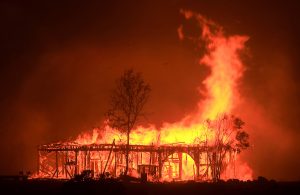 The historic wildfire season that left thousands of homes destroyed and millions of acres burned in the western states is likely to be reprised in the coming years with increased levels of wildfire destruction, according to a new study released by ClimateCheck.
The historic wildfire season that left thousands of homes destroyed and millions of acres burned in the western states is likely to be reprised in the coming years with increased levels of wildfire destruction, according to a new study released by ClimateCheck.
Looking forward, ClimateCheck forecasts that 9.3 million acres nationally will be burned each year by 2050. Of the 20 areas identified in the study as carrying the highest risk of fire, more than half have growing populations and six are in the top 15% of the nation’s fastest-growing counties.
ClimateCheck highlighted the potential danger that awaits Placer County, northwest of Sacramento, warning that the typical home in that county carries a wildfire risk score of 98 out of 100 while the region is projected to burn 28,498 acres a year by 2050. While these risks loom on the horizon, Placer County’s population has grown nearly 7% in recent years, placing it in the 15th percentile of fastest-growing counties.
The study also noted three counties in Utah’s Greater Salt Lake area — Weber, Morgan, and Salt Lake counties — carried property risks for fire are 97, 95, and 88, respectively, and were projected to burn more than 55,000 acres collectively a year by 2050. And all three counties have seen population booms in recent years: Weber County by 6%, Morgan County by 17.5%, and Salt Lake County's by nearly 7%.
“There are many reasons people continue to run into the fire," said Skylar Olsen, economic advisor to ClimateCheck. "Whether pushed to the periphery by affordability concerns or pulled there by the value of space, a more natural world, and a slower pace, many are attracted to more rural areas for affordable options outside of large- or medium-sized cities with job availability.”
Olsen added that “building into the wildland-urban interface will put more homes and people at risk. Prudent zoning measures and strategic property and forest management, are a must as climate change will continue to bring more serious wildfire seasons to the Western U.S., more often.”

 theMReport.com Your trusted source for mortgage banking news
theMReport.com Your trusted source for mortgage banking news









